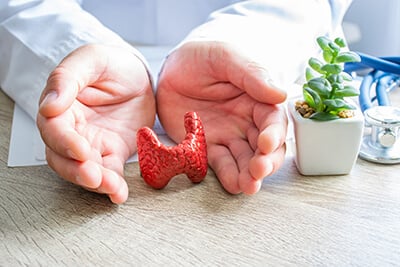
A thyroid disorder can be a challenge to live with, but you’re not alone. Millions of people across the globe are dealing with the same issues every day. In this rapid fire Q&A, we’ll discuss some of the most common problems that thyroid patients face and provide some advice on how to manage them. Whether you’re just starting your journey with a thyroid disorder or you’ve been living with one for years, this post is for you. Read on!
Why do thyroid problems cause weight gain?
Many thyroid conditions can lead to weight gain in some individuals. This weight gain is due to shifting metabolic functions that affect the thyroid gland and the endocrine system’s feedback mechanism. Research continues into finding what thyroid hormones do within the body, why they are important, and which thyroid conditions result in weight gain or weight loss.
Some thyroid hormone treatment options for hyperthyroidism may cause patients to experience short-term weight loss. However, once their weight stabilises this weight loss is reversed — most often with an increase in appetite during periods of stability at their new steady state weights. Thyrotoxic conditions (such as Graves’ disease, Toxic nodular goitre etc) and thyroid cancer are the only thyroid diseases definitively linked with weight loss.
Any of the thyroid conditions that cause an under activity of the gland (i.e., hypothyroidism) potentially results in weight gain or inability to lose weight. Hypothyroidism is a condition in which the thyroid gland does not produce enough thyroid hormone. This can cause a number of symptoms like fatigue, tiredness, cold intolerance, dry skin, mental fog, diffuse hair loss etc, in addition to the weight gain.
Some people may be more likely to experience more weight gain than the others. This is because thyroid hormones help to regulate the body’s metabolism . When the thyroid gland does not produce enough thyroid hormone, the body’s metabolism slows down which results in increase of weight or inability to lose weight despite the person’s best efforts.

In addition, many people with thyroid problems also have other health conditions that are linked with weight gain. For example, hypothyroidism is also seen in association with obstructive sleep apnea and polycystic ovarian syndrome which in turn are strongly associated with weight gain.
Some people may also gain weight when they are taking thyroid hormone replacement therapy . This is because thyroid hormones help to regulate the body’s metabolism. When a person takes thyroid hormone replacement therapy, their metabolism will speed up and they may experience weight loss. However, once their weight stabilises at their new steady state, they may gain weight if the total amount of calories being consumed exceeds their daily calorie expenditure.
On the other hand, thyroid conditions that cause overactive thyroid gland and overproduction of thyroid hormone (i.e., hyperthyroidism) may result in weight loss. Thyrotoxic or hyperthyroid conditions (such as Graves’ disease and Toxic nodular goiter) can be associated with weight loss. Treatment of hyperthyroidism can stabilize weight loss or can also result in weight gain.
List of Thyroid Function Tests to ask for to test for in Thyroid screening
- Thyroid Stimulating Hormone (TSH)– Also known as thyrotropin. This is the hormone produced by the pituitary gland which stimulates the thyroid to produce thyroid hormone.
- Free Thyroxine (FT4)– Measurement of the free, unbound T4 (thyroxine) hormone which is the biologically active hormone taken up into cells.
- Total Thyroxine (TT4)– Measurement of both free and protein bound T4 hormones.
- Free Triiodothyronine (FT3)- Measurement of the free, unbound hormone T3 (triiodothyronine) which is the biologically active hormone taken up into cells.
- Total Triiodothyronine (TT3)– Measurement of both free and protein bound T3 hormones.
- Antithyroglobulin antibodies (anti-Tg) and antithyroid peroxidase antibodies (anti-TPO). These tests check for autoimmunity (Hashimoto’s thyroiditis) that can cause a person’s own thyroid cells to be attacked by their immune system. May be useful to check in a person with personal or family history of autoimmune diseases.
- Thyroid stimulating immunoglobulin (TSI) and thyroid receptor antibody (TRAb) are antibody tests used in the diagnosis of Graves’ disease. Patients with hyperthyroidism who have elevated levels of these antibodies have a diagnosis of Graves’ disease as the cause for their hyperthyroidism.
- Reverse T3 (rT3)- This is the inactive metabolite produced from thyroxine. This test is not generally used in the diagnosis or monitoring of hypothyroidism or hyperthyroidism. It is most helpful to check rT3 if trying to differentiate between nonthyroidal illness (euthyroid sick syndrome) or true hypothyroidism in hospitalized patients. Not typically checked in the ambulatory setting.
- Free Thyroxine Index (FTI)- This is a calculation of how much free thyroxine there is in relation to total thyroxine and thyroid binding globulin in the blood. This is an older method of estimating free thyroid hormones in the blood. With the advent of newer diagnostic assays and modalities, this test is not usually done and is largely replaced with the Free Thyroxine (FT4) assay.
General information about thyroid function tests:
- TSH and free T4 are the tests most useful for diagnosing primary hypothyroidism.
- TSH, free T4, and total T3 are the tests most useful for diagnosing primary hyperthyroidism.
- Free T3 assays are less reliable and more variable due to very low overall concentrations in the blood. Best test to measure T3 hormone levels in the blood is total T3.

Do Men get Thyroid Problems & What Symptoms should I look out for?
Yes, men can get thyroid problems.
The most common type of thyroid problem in men is an enlargement of the thyroid gland, called a goiter. Other problems include overactive thyroid (hyperthyroidism) or underactive thyroid (hypothyroidism). Men can also get thyroid cancer.
Symptoms of an overactive thyroid may include:
- feeling warm and sweaty
- losing weight even though you are eating normally
- having a fast heart rate
- feeling nervous or anxious
- diarrhea
- gynecomastia/breast enlargement
- decreased libido
- erectile dysfunction
- problems with sperm production
Symptoms of an underactive thyroid may include:
- feeling cold
- gaining weight even though you are eating normally
- having a slow heart rate
- depression or feeling depressed
- constipation
- decreased libido
- erectile dysfunction
- delayed ejaculation
If you are experiencing any of these symptoms, you may need to have your thyroid function tested.
Can Thyroid Problems be a cause of Infertility?
Thyroid problems can cause infertility in both males and females. Infertility means the inability of a couple to naturally conceive with regular intercourse without use of contraception for twelve months or more in women less than 35 years of age or for six months or more in women 35 years of age and older.
In women, thyroid disorder can cause dysfunction during the menstrual cycle which can interfere with fertility. Women with hypothyroidism or hyperthyroidism may have problems with ovulation (the release of a mature egg from the ovary) which can result in infertility.
In men, thyroid dysfunction can cause erectile dysfunction and delayed ejaculation which may interfere with fertility. Overactive thyroid (hyperthyroidism) in men can cause abnormalities in sperm production and function.
Foods to eat to treat Constipation from Thyroid issues
If you are suffering from thyroid problems ( underactive thyroid) , then you may also be struggling with constipation. Fortunately, there are a few foods that you can eat to help relieve constipation.
Some of the best foods to eat for constipation caused by thyroid issues include prunes, figs, kiwis, papayas, and cruciferous vegetables like broccoli and cauliflower. All of these foods are high in fiber, which can help to stimulate bowel movements and relieve constipation.
- Drink a glass of water with lemon to stimulate the digestive system
- Eat more fiber-rich foods like beans, whole grains, and vegetables
- Take probiotics or eat yogurt for gut health
- Avoid caffeine and alcohol which can make constipation worse
- Try herbal teas such as peppermint tea iced tea, ginger tea, chamomile tea, or fennel seed tea iced tea
Final thoughts
Our Internal Medicine and Family Medicine Departments are here to offer medical care and treatment for your issues with your thyroid gland. We have an extensive team of professionals working together in one convenient virtual location so that there’s no need to go from doctor visit to doctor visit when managing this delicate organ in your body.
If you would like more information about what our services entail or if you are ready to book an appointment, click on the profile link of any of our highly regarded physicians below 👇

BLOG AUTHOR
Dr. Ismail Sayeed
Dr. Sayeed is the Medical Director of ViOS, Inc. He is a deeply committed physician entrepreneur & medical blog writer. While building the global infrastructure of the VIOS Clinic, he is dedicated to educate people on the potential of specialist telemedicine for managing chronic diseases.
Read more about him in his author bio



0 Comments